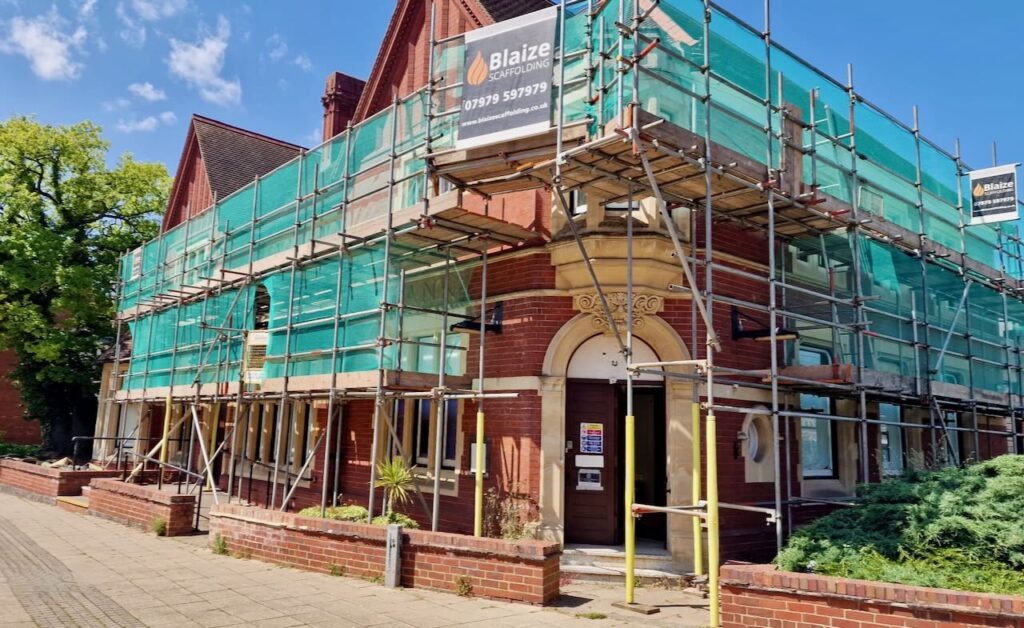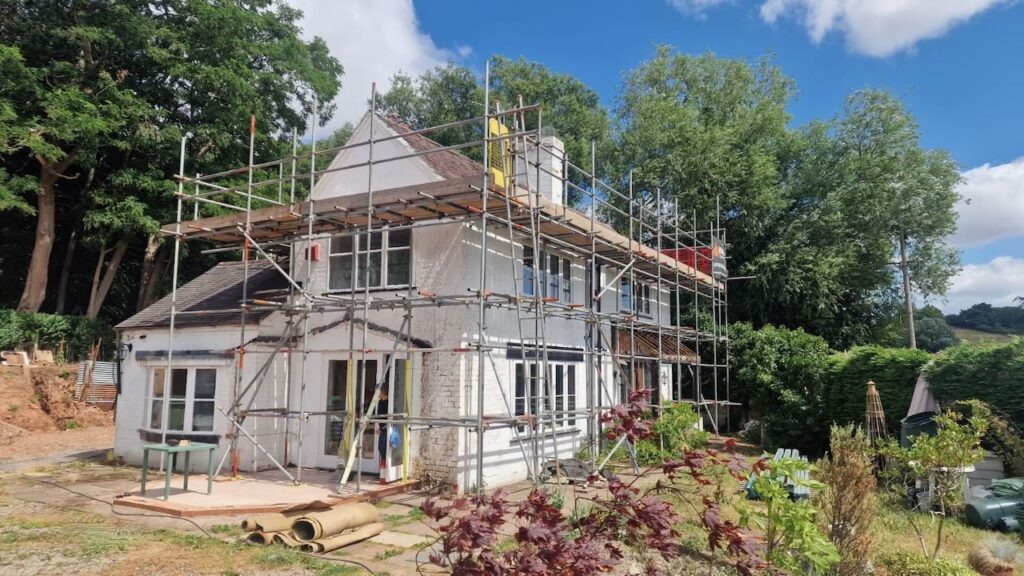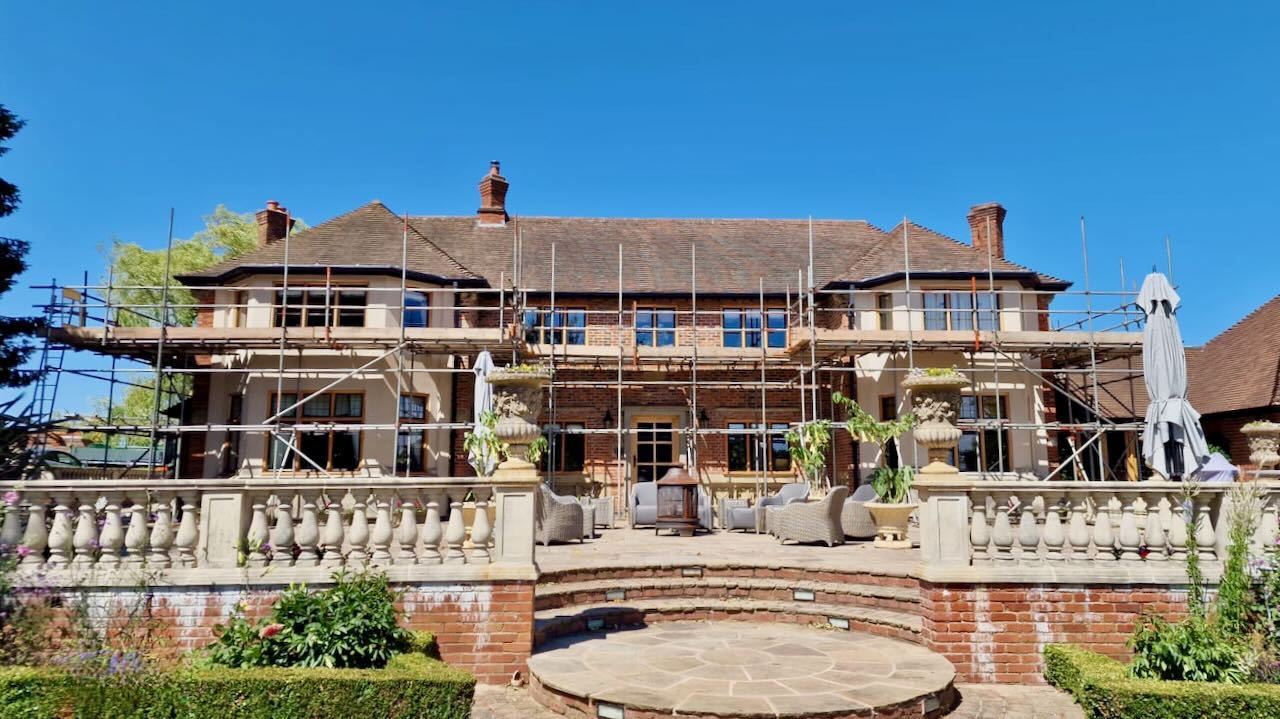When it comes to scaffold hire, not all projects are the same. The scaffolding requirements for a residential home renovation differ significantly from those needed for a commercial construction site.
From structural design and safety compliance to scheduling and budget, understanding the key differences between domestic and commercial scaffolding helps you choose the right solution for your build.
At Blaize Scaffolding, we supply tailored scaffolding systems for both domestic and commercial clients across Birmingham and the West Midlands. In this guide, we’ll break down the differences between domestic and commercial scaffolding, including regulations, use cases, costs, and what to expect from your scaffolding contractor.
What is Domestic Scaffolding?
Domestic scaffolding refers to scaffolding systems used on private homes and small residential buildings. These structures provide safe access for tasks such as roof repairs, painting, window installation, extensions, and chimney work.
Common Features:
- Usually erected on a single or two-storey home
- Shorter hire durations (1–4 weeks)
- Straightforward access with ladders or platforms
- May require permits if installed over pavements
- Erection and dismantling typically completed in one day
Domestic scaffolding must comply with UK working-at-height regulations, but is generally smaller in scale and faster to deploy. For more on legal responsibilities, refer to the Work at Height Regulations 2005.
What is Commercial Scaffolding?
Commercial scaffolding is used on larger-scale projects such as office buildings, retail units, schools, warehouses, and apartment blocks. These scaffolds are engineered to accommodate higher loads, multiple users, and longer durations.
Common Features:
- Multi-level platforms, often spanning full facades
- Designed for trades working simultaneously (roofers, painters, glaziers)
- Integrated safety features such as netting, staircases, and loading bays
- Requires detailed RAMS (Risk Assessments and Method Statements)
- Subject to regular inspections and sometimes CDM regulations
Due to their complexity, commercial scaffolds often take longer to plan, design, and construct. Visit the Health and Safety Executive (HSE) for more guidance on commercial scaffolding safety.

Key Differences Between Domestic and Commercial Scaffolding
1. Size and Load Capacity
Commercial scaffolds are built to handle greater loads—both people and materials—across more levels. Domestic scaffolds support fewer users and are designed for lighter access requirements.
2. Design Complexity
Domestic scaffolds are usually standard setups with edge protection and basic access. Commercial projects require bespoke designs, phased builds, hoists, and sometimes temporary roof systems.
3. Duration and Scheduling
Residential scaffolds tend to be short-term, ranging from a few days to a few weeks. Commercial scaffolds can remain in place for months, with weekly inspections and ongoing site adaptations.
4. Health & Safety Requirements
While all scaffolding must meet HSE standards, commercial sites require more documentation—RAMS, permits, and CDM-compliance. Domestic projects may not require the same level of formal process but still must be installed by trained professionals.
5. Permits and Local Authority Liaison
For both types, permits may be needed when scaffolding is erected on public highways or pavements. Commercial sites, however, often involve more extensive liaison with local authorities and utility providers. You can learn more about permits from GOV.UK.

Choosing the Right Scaffolding for Your Project
Whether you’re a homeowner or site manager, it’s important to work with a scaffolding company that understands the needs of your specific project.
At Blaize Scaffolding, we:
- Offer fast, affordable domestic scaffolding for home renovations in Birmingham neighbourhoods like Harborne, Selly Oak, and Kings Heath
- Design safe, scalable commercial scaffolds for retail, public sector, and industrial projects across the West Midlands
- Conduct site visits and provide detailed quotes tailored to your timeline and budget
- Provide RAMS, inspections, and council permit management as needed
Real-World Examples from Blaize Scaffolding
- Domestic Example – Edgbaston Loft Conversion: We erected a rear-facing scaffold with temporary roofing and ladder access for builders converting an attic. The project ran for three weeks.
- Commercial Example – Sutton Coldfield School Refurbishment: A multi-storey scaffold was erected with stair towers, edge protection, and hoarding to separate staff and pupils from the worksite. The project lasted eight weeks during the summer break.
FAQs – Domestic vs Commercial Scaffolding
How do I know if my project is domestic or commercial?
If the work is on a private home, it’s generally domestic. Projects involving businesses, public buildings, or multi-occupancy units are considered commercial.
Is commercial scaffolding more expensive?
Typically yes, due to its complexity, duration, and materials required. We provide itemised quotes so you understand all costs upfront.
Can the same company handle both?
Yes. Blaize Scaffolding has teams dedicated to both domestic and commercial sectors. Our services are tailored to match project size and scope.
Do I need a permit for domestic scaffolding?
Only if it extends over a public path or road. We’ll manage the application with your local council if needed.
How soon should I book scaffolding?
For domestic projects, 2–3 weeks’ notice is ideal. For commercial sites, we recommend 4–6 weeks due to planning and logistics.
Conclusion: Scaffolding for Every Scale of Project
Domestic and commercial scaffolding differ in size, complexity, safety compliance, and planning—but both require professional installation and oversight.
At Blaize Scaffolding, we bring experience, reliability, and compliance to every project—whether you’re repainting a two-storey terrace or managing a full-scale commercial renovation.
To discuss your needs and learn more about our services, call Blaize Scaffolding at 0121 270 7868 or 07979 597 979.

